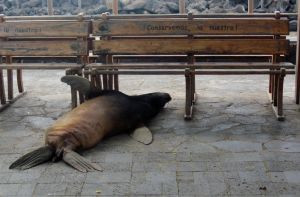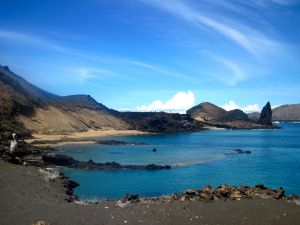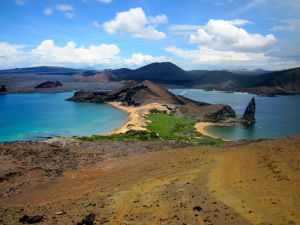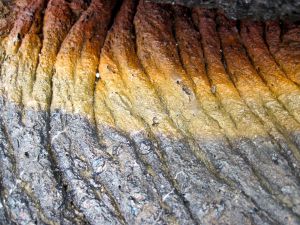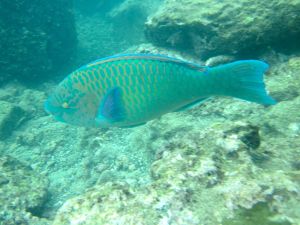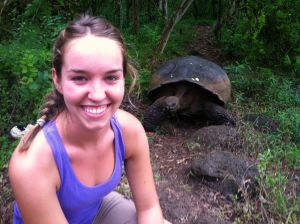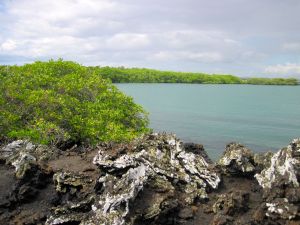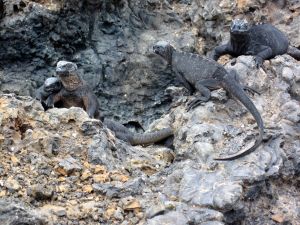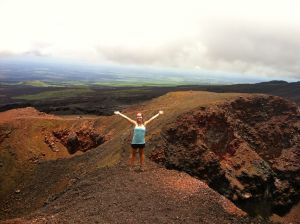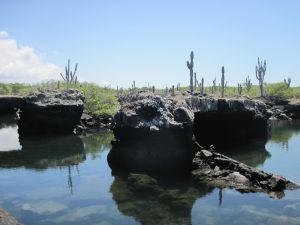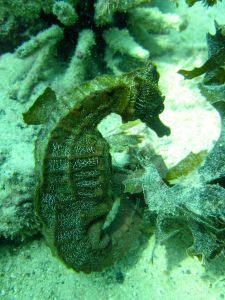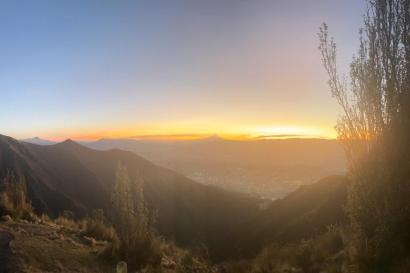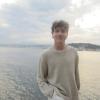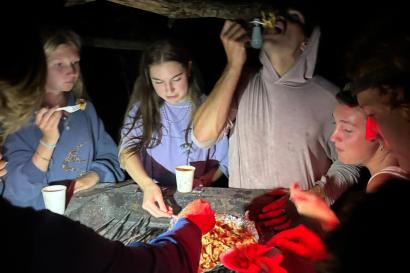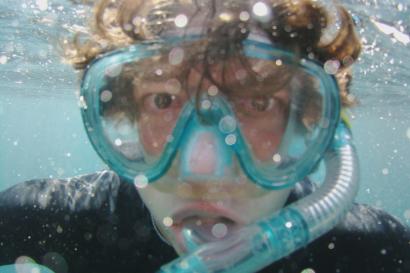Me, after our Spring break island hopping trip (in a good way).
Never have I had such an active and adventurous Spring break! We left Friday after classes and took a 2 hour boat ride to Santa Cruz island. We were split into groups and did various activities each day. On Saturday, my group went to Bartolome Island. It was my favorite activity of the trip!
The boat ride to Bartolome is about 2 hours. We took a fancy yacht there and had dolphins playing in front of us. When we arrived, we went on a hike to the top of Bartolome. This is the view when we first landed.
This scene from the top of Bartolome is probably the most used image for Galapagos advertisements, and for good reason. It is stunning. The lava fields in the back left are only 200 years old, so when Charles Darwin came to the Islands, those lava fields weren’t there.
After our hike we took a zodiac ride to look at Galapagos penguins and to the lava fields. I was amazed by the designs in the lava and the color variations as the lava fields erode, creating nutrients so plants can colonize this area in the next million years or so.
Our final activity of the day was snorkeling. I loved the snorkeling here because it was kind of a mix of everything we had seen so far. There were White-Tipped Reef sharks, corals, urchins, sea stars and tons of fish. The Parrot Fish (above) were huge. I love their silly faces and wild coloration.
At one point in the snorkel, our guide took off through a really strong current. Only 5 of us made it through (the rest went back to the boat) and I was so glad I did! We saw an octopus, a field of sea stars, rays that were so large they filled caves and more sharks. Overall the day was wonderful!
The next day, my group went to the highlands of Santa Cruz. Our first stop was Los Gemelos. Twin craters that were created from a lava tunnel. We hiked around them both, dancing to avoid fire ants, saw many species of birds and learned about the invasive fly capture program at the Charles Darwin Station. These flies lay their eggs in the nests of finches, so the larva enter the nostrils of finch chicks and kill them. The Station is working to eradicate them using fly traps and so far the programs looks promising.
Next we went to an open area for giant tortoises and had lunch there. This is me with one of the tortoises.
After lunch we went through a lava tube. It was nicely lit with artificial light and was cleared out somewhat so that we could easily walk through. Our final activity of the day was a trip to a mangrove lined beach to swim and relax before dinner. It was fun to body surf in the waves and relax near the water.
The next morning we took another 2 hour boat ride to Isabela Island. This island has much fewer people and buildings than the Santa Cruz and San Cristobal, and it is incredibly beautiful. After checking into the hotel and lunch, we went snorkeling in a lagoon.
It is interesting to snorkel near mangroves. The urchins use their leaves to cover themselves and it is strange to see leaves in the ocean. Above is a photo of a small eel I found.
We started and finished our snorkeling activity from a rocky area that we took a water taxi to get to. After snorkeling, I was looking out at the taxi, planning how I would swim out to it, when a Galapagos penguin popped out of the water next to me. They are the second smallest penguin species and the only species living this close to the equator.
After snorkeling we went to Tintoreras, an islet where the White-Tipped Reef sharks go to rest and young Marine Iguanas cover the rocks.
The Marine Iguanas are just starting to have young, so there weren’t very many this time of year, but we saw 15 or so sharks in the channel near the islet.
The next day on Islabela, we hiked the Sierra Negra volcano. It is a fun hike and our guide told us it was 11 miles or 18 km. I am not sure I believe that though! The hike starts with damp ferns and trees that lead to the caldera of the volcano. We bushwhacked along the caldera and then hiked over the other side to the lava fields.
These lava fields are full of colorful lava, vents that leak warm air from the volcano below and have views of the rest of Isabela Island and Floreana Island. After our hike, we had a delicious lunch at a fruit farm, where we could pick passion fruits and coconuts to eat! We then went to another lava tube (this time without artificial lights) and hiked to the back of it for a minute of silence in the dark. It was fun to have our sense of sight cut off and to be able to hear all of the water drips in the lava tube.
On our way back to the hotel our guide surprised us by taking us to see wild flamingos. They flew over our heads and landed in this lagoon.
The morning of our final day on Isabela (and of the vacation part of this trip), I woke up early to watch the sunrise over the ocean. That day we went to Los Tunneles.
Los Tunneles is a beautiful place where lava has eroded into tunnels. The boat ride there consists of crossing huge breaking waves and watching for Manta Rays as big as the boat. Once there we walk along the tunnels and then snorkel.
While snorkeling we found a seahorse and a lobster, and on our way back we saw an 18ft Manta Ray!
The Last two days of the trip were spent on Santa Cruz where we had lectures from NGOs like Conservation International, World Wildlife Fund and the Charles Darwin Station. Our next classes are about invasive plant species or marine ecosystem management.
Overall, this Spring break was one for the books. Where else is it possible to see Marine Iguanas, flamingos, seahorses, penguins, volcanoes, tropical fish and sharks in one week?

Holly Callahan
<p>Hello! My name is Holly and I love nature and the ocean. For four months I will be studying Marine Ecology in the Galapagos Islands. I can't wait study, live and explore one of the most beautiful and wild places in the world. Adventure awaits!</p>
